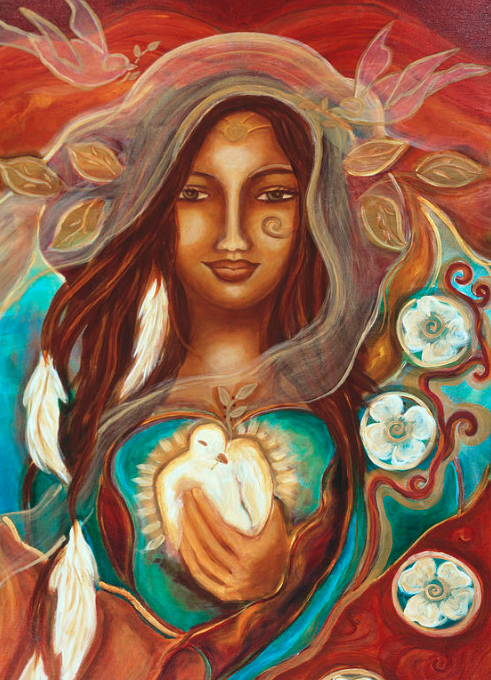
Moonlight shines over the dry Mongolian steppes. The expanse is no longer lush with the great green organ that used to feed life. Many decades ago, while the regime claimed control of these areas, the grasslands dried up. First it was the wolves who weren’t welcome. The commanders didn’t like the helplessness they felt when they couldn’t protect their horses from the stealthy and organized night attacks. So the wolves were hunted, right out of the dens, pups and old alike. Then the grazing animals, left with no predators ate more than the land could take. The soils loosened, the winds grew, and finally, after enough seasons of diminishing tegsh or balance, the topsoil simply blew away. Moonlight raises her arms to the night sky, drawing in her breath, in one hand is a cup of milk, mixed with vodka, and in the other, a staff, covered in metal and bones.
Buryat Shamanism can be found in southern Siberia and northern Mongolia, and its shamans play an important role maintaining tegsh or “balance” for the community. They guide their communities to act in reverence for the natural world, which they view as mother to humanity. Mongolian and Siberian shamans believe that if natural resources are taken without asking and thanking the spirits, these resources will not be replenished and possible other consequences can ensue like health challenges in the plant, animal, or human population.
In the story above, the mongolian word for moonlight is sarangarel. Sarangarel is the woman who after her shamanic teachers were freed to practice after the collapse of the soviet union, wrote two books about the rituals and practices of Buryat Shamans. It’s from her that I learned the word, Sahius.
With her arms raised, cup and staff in hand, she is using Sahius. Sahius, pronounced “sah-hee-os” might be considered similar to the medicine bag of native north american shamans. It is said that no one can know the power she carries in her medicine bag, sometimes it’s a tool, at others it’s a prayer. Sometimes the medicine comes from far away, if you listen quietly, you can hear it coming.
Moonlight gently leans her head towards the wind, as though to listen, and bows her head rhythmically, following the syllabic pulse. A phrase unfolds from each gust, words belonging to those she cannot see, she let’s their voices enter her mind.
Shamans have been the ones to “clear” or “clean” unwanted spiritual debris accumulated by the community. Sometimes members who have knowingly or unknowingly behaved in a displeasing manner, evidenced by some suffering in theirs and their descendants lives, require a ritual. Rituals can go on for days and sometimes involve many members of the family and community. Other times, the shaman must perform the ritual for the community, during which he or she might cleanse and heal people, appeal to nature spirits, converse with the ancestors of community members, or through no small effort, eradicate darkness that has coalesced in a place or person.
The Sahius may contain protectors, emblems, or objects that act as barriers to the shaman attracting harm during their work. It may contain talismans that amplify her abilities or which house certain spirits who have agree to work with the shaman and help her. The bag contains offerings, used when asking for the spirit of a place or for the ancestors to come forward in the ritual. It may also contain reminders for the shaman about who they are, where they come from, and connect them to the moment of their birth and the land they were born to. There are also medicines, substances used for healing or vision when a question needs answering. These are just a few possibilities.
Tonight she’s come to hear, rather than to ask. These years have taken much from the land and her people. It’s no longer a question of how to bring the grassland back, now it’s to ask how can we properly grieve what has been lost? How can Moonlight carry the message that begins the reconciliation between people and this place? She tips her cup on the dry earth, and lifts her staff to begin her prayers—above, below…north, east, south, west…circling her staff…
We aren’t too far from where Sarangarel stands. We each have a relationship we’re called to with the Unseen. Whether we believe it’s by our own good luck and great efforts that we have made it this far, I’d make my bet that we’ve been collaborated with. Even if by chance, or with indifference, we are partnered with by something or someone beyond our direct knowing, we do not go it alone. Every one of our lands have been infringed upon, not just by us, but for centuries in most places. Every one of our bodies, like the earth, have had to do things we didn’t want to do. How to remember and make right with that? As we decide our next steps, discern the urges that seemingly come to us from out of the thin air, we might all carry some form of our Sahius, from which we can be protected, amplified, dispense, remember and be remembered. The Sahius is how we make our way, the toolkit for the conversation with the Unseen, and the currency with which we humbly and thankfully join in the magic.
Each offering of my blog, The Sahius speaks to a moment when I or someone I know knowingly or accidentally used their Sahius and a noticeable result in relationship to the Unseen occurred. It happens in the most subtle ways sometimes, or years later, long after you’ve been thinking about it.
The subtle emerges in the everyday, and we’re here to watch for it.
I’m fascinated, enchanted, and willing to participate with the relationships on offer, I’m interested in honouring the intelligence and generosity of these relationships, and when time, I’m available to serve those relationships, just as they serve me. Learning to hear, transpose and decode, and then speak the myriad of languages we are surrounded with is my life’s work and one that I invite you into as well. It’s with babies, nature, the unseen forces of our health, our ancestors, and beyond.
Thank you to Sarangel, who is no longer living, for translating the wisdom of her people and land. And thank you to all those whose continuing to remember defies what cruel intenders had designed for them.

